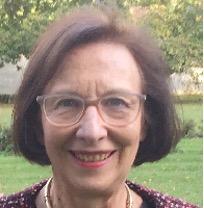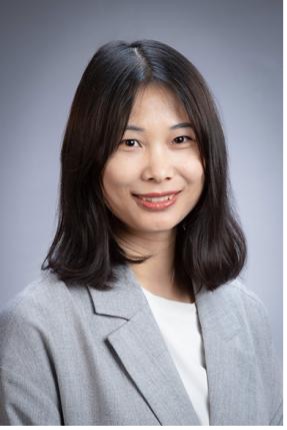The IEEE Fellow Program recognizes IEEE members that have made a remarkable contribution to an IEEE field. While women IEEE members are making great strides in their specific IEEE fields, there is still a big discrepancy between the number of men and women IEEE fellow nominations. This panel is a joint initiative between IEEE CIS WCI and IEEE WIE to provide support and encouragement to women in Computational Intelligence to achieve IEEE fellow status. The panel will provide guidance and discuss challenges, mapping a way forward to support women in Computational Intelligence in becoming IEEE Fellows.

Sarah Rajala served as the 12th dean of the College of Engineering at Iowa State University from 2013 - 2019. She led the largest college on campus and was responsible for more than 9,500 students, 500 faculty and staff, 12 academic majors, multiple research centers and programs, and 11 buildings that comprise the engineering complex. Her previous leadership positions were at Mississippi State University as dean of engineering from 2008-13, and chair of the electrical and computer engineering department prior to being named dean. She also served at North Carolina State University as associate dean for research and graduate programs and associate dean for academic affairs in the college of engineering. She had a distinguished career as a professor and center director prior to moving into administrative positions.
Rajala is an internationally known leader who has served on many academic and association boards. She has consistently broken new ground for women in engineering, served as a role model for young women, and is passionate about diversity of thought and culture. Rajala is a past president of the American Society for Engineering Education; past chair of the Global Engineering Deans Council; Chair of the ABET Engineering Commission; and IEEE Committee on Engineering Accreditation Activities PEV Assignment Coordinator. Currently, she serves on the IEEE Foundation Board, the ABET Board of Directors, and the ABET Bridge (Foundation Board). In 2022 she was elected to the National Academy of Engineering; she received the ASEE Sharon Keillor Award for Women in Engineering in 2020; the IEEE Award for Meritorious Achievement in Accreditation Activities in 2017; the national Engineer of the Year Award by the American Association of Engineering Societies in 2016; and received the IEEE Harriett B. Rigas Award in 2015. She is a fellow of the AAAS, ABET, ASEE and IEEE. Rajala earned her bachelor's degree in electrical engineering from Michigan Technological University and master's and Ph.D. degrees from Rice University.

Mengjie Zhang is a Fellow of Engineering New Zealand, a Fellow of IEEE, an IEEE Distinguished Lecturer, currently Professor of Computer Science at Victoria University of Wellington, where he heads the interdisciplinary Evolutionary Computation and Machine learning Research Group. He is the Associate Dean (Research and Innovation) for the Faculty of Engineering, and also leading the strategic initiative for Data Science and Artificial Intelligence at the University
His research is mainly focused on AI, machine learning and big data, particularly in evolutionary computation and learning, feature selection/construction and big dimensionality reduction, computer vision and image analysis, scheduling and combinatorial optimisation, classification with unbalanced data and missing data, and evolutionary deep learning and transfer learning. Prof Zhang has published over 800 research papers in refereed international journals and conferences. He has been serving as an associated editor for over ten international journals including IEEE Transactions on Evolutionary Computation, IEEE Transactions on Cybernetics, the Evolutionary Computation Journal (MIT Press), and involving major AI and EC conferences as a chair such as GECCO, IEEE CEC, EvoStar, IJCAI, AAAI, PRICAI, PAKDD. He has also been serving as a steering committee member and a program committee member for over 100 international conferences. Since 2007, he has been listed as one of the top ten (currently No. 4) world genetic programming researchers by the GP bibliography.
Prof Zhang is currently the Chair of the IEEE CIS PubsCom Strategic Planning (sub)Committee, the Chair of the IEEE CIS Outstanding PhD Dissertation Award (sub)Committee, a past Chair of the IEEE CIS Intelligent Systems Applications Technical Committee, the IEEE CIS Emergent Technologies Technical Committee and the IEEE CIS Evolutionary Computation Technical Committee, and the founding chair of the IEEE Computational Intelligence Chapter in New Zealand.

Bernadette Bouchon-Meunier is a Director of research emeritus at the National Centre for Scientific Research, the former head of the department of Databases and Machine Learning in the Computer Science Laboratory of Sorbonne Université. She supervised 52 PhD students. She is the Editor-in-Chief of the International Journal of Uncertainty, Fuzziness and Knowledge-based Systems and the Co-executive director of the IPMU International Conference held every other year since 1986. She is the (co)-editor of 30 books, and the (co)-author of five. She has (co)-authored more than 400 papers on approximate reasoning and applications of fuzzy logic and machine learning techniques. She is Past President of the IEEE Computational Intelligence Society. She is an IEEE Life Fellow, an International Fuzzy Systems Association Fellow and an Honorary Member of the EUSFLAT Society. She received the 2012 IEEE Computational Intelligence Society Meritorious Service Award, the 2017 EUSFLAT Scientific Excellence Award, the 2018 IEEE CIS Fuzzy Systems Pioneer Award and the 2019 Outstanding Volunteer Award of the IEEE France Section.

Ying Bi is currently a postdoctoral research fellow in artificial intelligence with the School of Engineering and Computer Science at Victoria University of Wellington (VUW). Her research focuses mainly on machine learning, computer vision, evolutionary computation, classification, image analysis, feature learning, and transfer learning. She has published an authored book on genetic programming for image classification and over 50 papers in fully refereed journals and conferences in evolutionary computation.
She is a member of IEEE, IEEE Computational Intelligence Society (CIS) and the Association for Computing Machinery (ACM). She is the vice-chair of IEEE CIS Task Force on Evolutionary Computer Vision and Image Processing, a member of IEEE Women in Computational Intelligence Subcommittee, IEEE Task Force on Computational Intelligence for Diversity, Equity and InclusivitY (DEITY), IEEE CIS Task Force on Evolutionary Computation for Feature Selection and Construction. She has been serving as an organizing committee member of IEEE CEC 2019 and Australasian AI 2018, the workshop chair of IEEE CEC 2024, a guest editor of the journals of Applied Soft Computing, Memetic Computing and Algorithms, the organizer of the workshop on EDMML in IEEE ICDM 2022, 2021, the organizer of the special sessions/symposiums in IEEE WCCI/CEC 2022, IEEE SSCI 2022, IEEE SSCI 2021, and IDEAL 2021. Dr Bi has been serving as a program committee member of over ten international conferences including IJCAI, GECCO, IEEE CEC, IEEE SSCI, and Australian AI. She is co-chair Poster session in IEEE CEC 2019. She has been serving as a reviewer of over ten international journals including IEEE Transactions on Cybernetics and IEEE Transactions on Evolutionary Computation.

Nelishia Pillay is a Professor at the University of Pretoria, South Africa. She holds the Multichoice Joint-Chair in Machine Learning and SARChI Chair in Artificial Intelligence for Sustainable Development. She is chair of the IEEE Technical Committee on Intelligent Systems Applications, Vice Chair of the IEEE Technical Committee on Evolutionary Computation, chair of the IEEE Task Force on Automated Algorithm Design, Configuration and Selection and chair of the IEEE CIS WCI subcommittee. She is associate editor for IEEE Computational Intelligence Magazine, IEEE Transactions on Emerging Topics in Computational Intelligence, Swarm and Evolutionary Computation, ACM Transactions on Evolutionary Learning and Optimization and the Journal of Scheduling. Her research areas include hyper-heuristics, automated design of machine learning and search techniques, combinatorial optimization, genetic programming, genetic algorithms and deep learning for and machine learning and optimization for sustainable development and equity, diversity and inclusion. These are the focus areas of the NICOG (Nature-Inspired Computing Optimization) research group which she has established. She has published in these areas in journals, national and international conference proceedings. She has served on program committees for numerous national and international conferences and is a reviewer for various international journals.